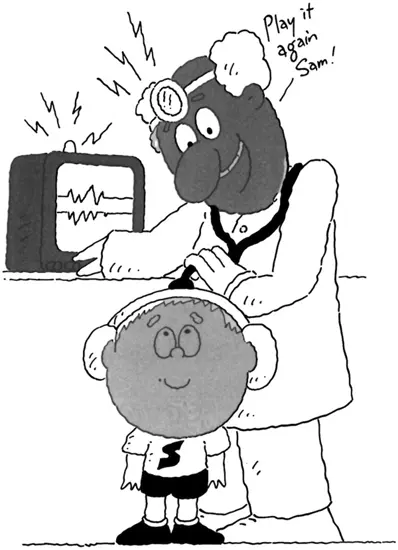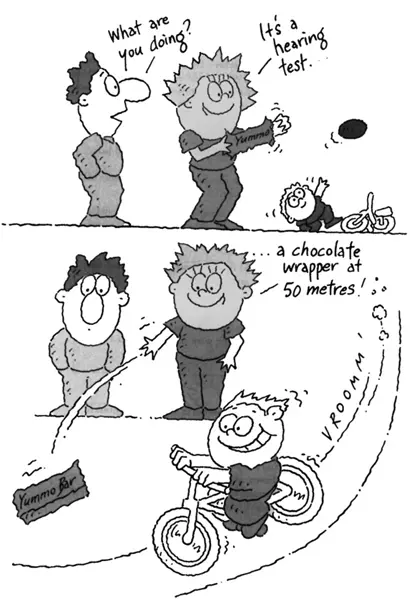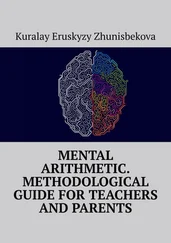At a large parents’ meeting I once addressed, I asked if people would call out the ‘you’ messages they remembered hearing as children. I wrote them on a blackboard and this is what we came up with:
The examples came in little rushes at first, as people’s memories were triggered, but by the end the blackboard was covered and the room was almost in a state of riot. The sense of relief and release was very evident in the large hall as people spoke aloud the words that had hurt them so long ago.
Very few people felt their parents had been deliberately destructive or malicious – it was simply that this was the way children were corrected. ‘Tell them they’re bad and that makes them good!’ Those were the Dark Ages of child-rearing: we’re just beginning to escape.
Your mind remembers everything that ever happened to you
In the 1950s people with epilepsy had a bad time because the medications we now use had not been developed. A man called Penfield found that an operation could be used to help the more severe cases. By making small cuts on the surface of a person’s brain, he could sometimes reduce or even halt the ‘electrical storms’ which cause epileptic seizures.
The interesting part – I hope you’re sitting down as you read this – is that the patients were required, for safety reasons, to be conscious, and the operation was done under only a local anaesthetic. The surgeon removed a small piece of skull, made the cuts and then put back the piece and sewed up the skin. It makes me shudder, too, but it was better than the disease!
During the operation the patients experienced something very surprising. As the doctor, using a fine probe, made tiny contacts with the surface of the brain, the patient would suddenly have vivid recollections – watching Gone with the Wind years earlier, complete with the smell of cheap perfume in the cinema and the beehive hairstyle of the person in front! When the doctor moved the probe to another spot, the person would see before him his fourth birthday party – even though he was wide awake and sitting in the operating chair. It was the same with every patient, though of course the memories were different.
Subsequent research backed up this remarkable discovery: that everything – every sight, sound and spoken word – is stored in our brain. It is often difficult to remember but nevertheless it is there, having its effect. On the wrinkled surface of our brain our life is recorded in its entirety!

Unconscious hearing is a phenomenon that you’ve almost certainly experienced. You’ve been at a party or a meeting, listening to someone near you. The room is buzzing with people talking and perhaps music, too. Suddenly, from a conversation clear across the room, you hear someone say your name, or the name of a friend, or something that concerns you. ‘Aaargh!’ you think, ‘what are they saying about me?’
How does this happen? We have discovered from research that there are two parts to your hearing: firstly, what your ears actually pick up; and secondly, what you pay conscious attention to.
Although you are unaware of it, your brilliant hearing system is filtering every conversation within range in the room and, if a key word or phrase occurs, the switchboard department in your brain ‘puts it through’ to conscious attention. You certainly couldn’t listen to all that was being said at one time but, nonetheless, a primitive filter is scanning it for important messages. We know this from many experiments and also from the fact that under hypnosis people can recall things that they didn’t consciously notice at the time!
The following situation has been reported in many parts of the world.
Late one night a petrol tanker runs out of control, careers down-hill and smashes through the front wall of a house. When rescuers enter the house they are amazed to find a young mother sleeping heavily, undisturbed by the crash. As they stand there, not knowing what to do, a baby begins to cry in the back room. The mother instantly awakes. ‘Wha…what’s going on?’
The filter in her hearing system works on as she sleeps but is checking for only one thing – the baby – and only this sound is ‘put through’ to her mind.
How does all of the above relate to children? Think of all the things that are said about children when they are supposedly not listening. Then remember their acute listening powers (a sweet wrapper at 50 metres!). We may well include the time when they are asleep for there is clear evidence that sounds and speech are taken in even as a person dreams and sleeps.
Also, there is that obvious time when a child has not yet learnt (or decided to let you know) that it can speak. The baby, for months before it speaks much, can follow much of what is intended, if not every word.
I am often amazed by parents, who have been fighting bitterly for years or are desperately unhappy for some reason, telling me, ‘Of course, the kids know nothing about it’. Children, in fact, know almost everything about everything. They may oblige you by keeping it to themselves or only show it indirectly by bedwetting or trying to murder their siblings, but they know. So, if you talk about your children, be sure you are saying what you really want to say. This, too, is a direct channel to their minds.
And why not start to use this channel to boost them by saying what you genuinely like and appreciate to others while they’re in earshot? This is especially useful at ages/stages when direct praise is embarrassing to them.
Hearing and healing
This story is told by one of my teachers, Dr Virginia Satir.
A child had just been operated on for tonsil removal and, back in the ward, was failing to stop bleeding. Dr Satir joined the concerned staff in examining the still-open cuts in the child’s throat.
On an impulse, she asked what was happening in the theatre at the time of the operation.
‘Oh, we’d just finished a throat cancer operation on an old lady.’
‘What were you talking about.’
‘Oh that last operation, and how she didn’t have much chance of living – there was too much damage.’
Dr Satir’s mind worked fast. She saw the child undergoing the simple and routine procedure, under general anaesthetic, while the staff talked about the previous patient: ‘not much chance of living’, ‘pretty bad shape’.
Quickly, she asked that the child be taken back to the theatre. She instructed the staff in what to say:
‘Gee this kid looks good and healthy, not like the old lady we operated on before.’ ‘This kid has a nice healthy throat.’ ‘She’ll be healed in a jiffy and back playing with her friends!’
The bleeding stopped, the anaesthetic wore off and the child went home the next day.
Anchoring
Anchoring is one of the most recent discoveries in hypnosis. Scientists have realised that a message goes most deeply into a person’s mind if it is accompanied by other signals that reinforce it.
This is really quite simple.
If a person says to you, ‘You’re a pest!’, you will probably feel rather put out. If he says it with a frown and a loud voice, this will be worse. If he says it very loudly, moves towards you whilst making menacing movements and appears somewhat out of control, then you have a problem.
If he happens to be three times larger than you and is one of your family – on whom your well-being depends – you will probably remember the incident for the rest of your life.

Modern-day men and women, especially those of us of Anglo-Saxon descent, tend to be constrained in our day-to-day life. We do not act or speak with very much passion or force. It’s not that we are low-key and relaxed – just more controlled and bottled up. We tend to keep our good and bad feelings to ourselves and, when things go badly, we try to carry the burden without giving any outward signs. Consequently, when we finally do blow up or break down, we often surprise both ourselves and those around us. If the feeling being released is anger and frustration, then those around us may feel that we have lost control and are dangerous to them…and we may agree!
Читать дальше














